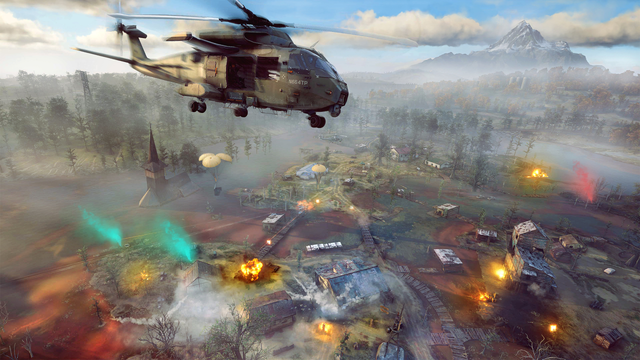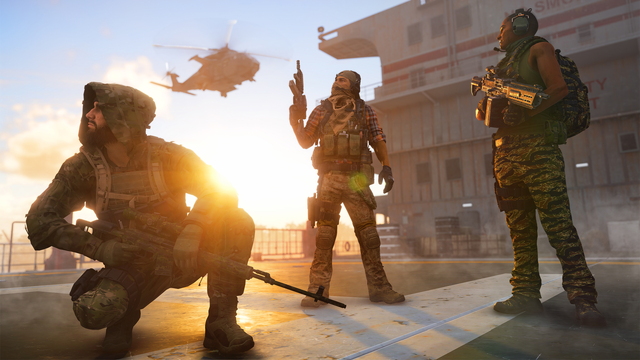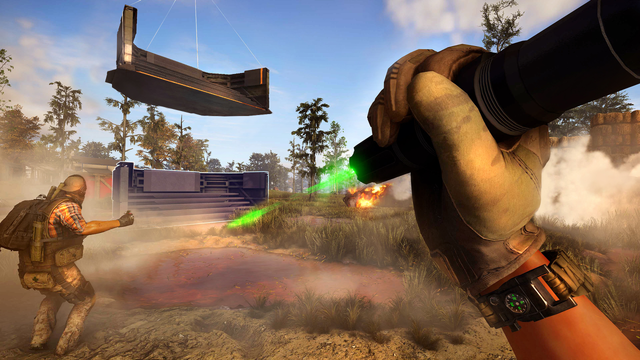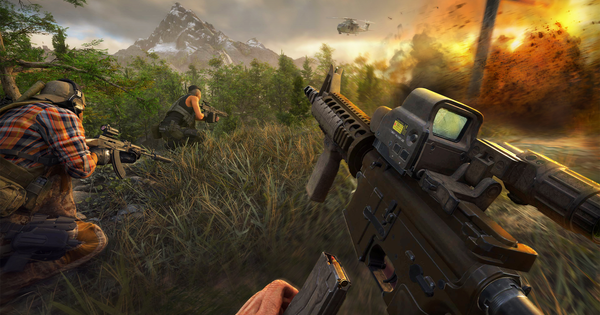In Ghost Recon: Frontline, one hundred players are independent contractors (“contractors”) who travel to an island of 4 x 4 km. There, they compete against other players to gather information and may even reveal a plot over time. This is done in groups of three contractors, each with their own class (unless you want to go around with three snipers, for example) and their own arsenal of weapons and tactical gadgets.
The goal of each game in the main Expedition mode is for you and your team to find three pieces of information, after which you can order the extraction and escape from the island. It’s not about killing as many opponents as possible in an ever-shrinking Frontline loop. Indeed: if the game does not go as desired and you are not able to kill others and find information yourself, you can ignore this goal and try to steal someone else’s grab by hitting in time. A small tactical twist.

Game Design Director Alexandru Rice emphasized during our conversation that Frontline’s gameplay is “free-form”: “We want players to make choices until the end of the game and offer different options to win, even if things don’t go well at the beginning.” So one of those ways is the ability to steal and extract other people’s information, because with all the bells and whistles going off to alert players in the area that another group of players is doing something. We’ve seen this before, for example, in Battlefield 5: Firestorm.
“Information gathering doesn’t happen overnight, so you’ll need to protect yourself and your teammates while you’re gathering information. While you’re doing this, other players will see your location, but you can keep walking around and shooting while you’re doing it,” Rice said. According to Rice, this information is scattered “almost randomly” across the island, with plenty of “fixed places” as well. So you have to explore the three biomes and nearly twenty landmarks (like the lighthouse) to find them. Although there is another option…

Not every team is supposed to look for intel like a headless chicken and ignore the others. The actions of other teams may point to the position of Intel, although you can also work more directly and question the players yourself. This was not covered in the official presentation, but the boss is definitely excited about it: “If you shoot an enemy and he’s still alive on the ground, you can go to him and interrogate him. This way you can reveal where his teammates are, but you can also get hints about information sites “.
There are all kinds of small actions that can lead to a good ending to an Expedition game. You can also choose to thwart other teams by, for example, turning off their car engine, sneaking behind them for information, or using so-called TAC support and skills. Not much is known about these skills, except that you get an active skill and two passive skills, and they differ in each class. At the moment, there is only the Assault, Support, and Scout category in the game. Ubisoft Bucharest wants to expand this offer with seasonal updates.
Separately, Frontline components may not seem like the most creative ideas, but it’s basically the combination and the resulting end result that should attract players to Frontline.
The most interesting is TAC support, because in Frontline you can shape the battlefield yourself using tools (about which little is known until now). You can drop all kinds of objects via TAC support. The most noticeable so far is the sniper turret, with which, of course, you can create an easy-to-use observation point, but also draw attention to yourself. A support class can also summon turrets, all kinds of cover items, and useful items such as ammo and armor plates (another component of a typical battle royale).
This doesn’t mean this has to become some kind of Fortnite light; You can’t build without limits, and Frontline sounds a lot more serious when it comes to tone. Rice: “We’re aiming for a tonal balance. We want the match to be grounded and not too crazy, but there’s room for playful moments.” Rice sets an example: “My favorite place on the island is some kind of dinosaur park. They found fossils and built a park around it, resulting in a somewhat more airy design.”

Separately, Frontline components may not seem like the most creative ideas, but it’s essentially the combination and the resulting end result that should draw players to Frontline, according to Rais. It remains to be seen if this combination will remain intriguing. In any case, the (first-person) shooter feels good old-fashioned, but we haven’t seen enough actual gameplay to predict whether Frontline can compete against such greats in the genre as Warzone. Ubisoft also keeps a few things in reserve. There is also a control play mode, where two teams of nine players battle each other for control of certain areas, with more modes added later.
In any case, the Frontline development method promises a lot of good, because Ubisoft Bucharest wants to do it with players from now on. “We’ll start with the Expedition mode, balance and mod the weapons and keep player control in good shape,” said Rice. The first step on this journey is PC testing that will begin on October 14 in Europe and run until October 21. Player feedback will then lead to new mods and determine what will be added to Frontline in the future.
Ghost Recon: Frontline is getting PC testing on October 14, exclusively in Europe, and will be playable on consoles later. A launch date has not been announced.

“Professional web ninja. Certified gamer. Avid zombie geek. Hipster-friendly baconaholic.”








